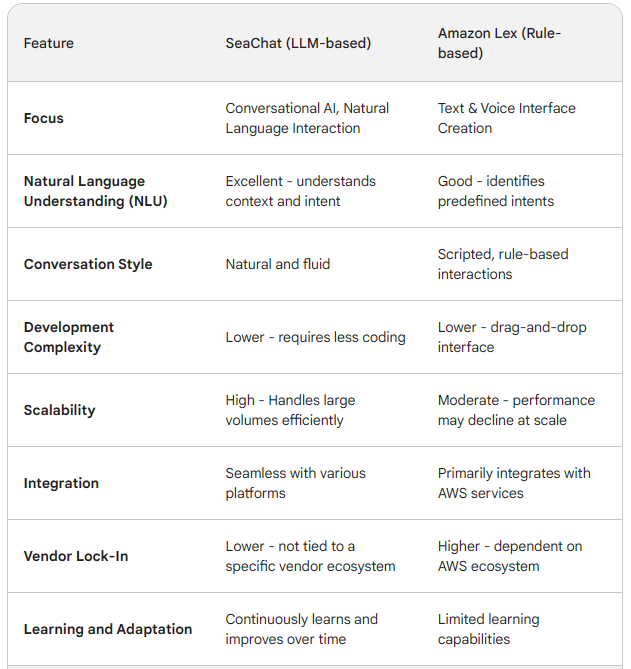The world of chatbots is evolving rapidly. While Amazon Lex has been a popular choice for building voice and text interfaces, a new wave of technology is taking center stage: Large Language Models (LLMs). SeaChat, a platform powered by LLMs, offers a groundbreaking approach to Conversational AI, leaving rule-based engines like Lex behind. Is it time to consider an upgrade for your chatbot?
Amazon Lex: A Reliable Workhorse, But Stuck in the Past
Amazon Lex has established itself as a workhorse for building chatbots. Its drag-and-drop interface and integration with other AWS services make it a user-friendly option. Here are some of Lex’s strengths:
- Ease of Use: The visual interface simplifies chatbot creation, minimizing the need for coding expertise.
- Quick Deployment: Lex allows for rapid chatbot development and deployment, ideal for quick projects.
- AWS Integration: Seamless integration with other AWS services streamlines development within the AWS ecosystem.
However, Lex also has limitations that can hinder your chatbot’s capabilities:
- Scripted Conversations: Lex relies on predefined intents and utterances, leading to a rigid and unnatural conversation flow.
- Limited NLU: Understanding complex user queries and adapting to context can be challenging for Lex.
- Scalability Concerns: Performance may decline when handling high volumes of user interactions.
SeaChat: Charting a Course for the Future of Chatbots
SeaChat, powered by LLM technology, offers a paradigm shift in Conversational AI:
- Advanced Natural Language Understanding (NLU): SeaChat excels at comprehending the nuances of human language, enabling natural and context-driven conversations.
- Conversational Learning: SeaChat continuously learns and adapts based on user interactions, constantly improving its ability to handle complex queries.
- Seamless User Experience: By understanding context and intent, SeaChat fosters a more natural flow of conversation, mimicking human interaction.
Here’s why SeaChat is the future of chatbots:
- Natural Conversation: Users crave chatbots that feel like talking to a person, exactly what SeaChat delivers through LLM technology.
- Reduced Development Time: Building chatbots with SeaChat requires less coding compared to rule-based engines, saving you time and resources.
- Scalability for Growth: SeaChat effortlessly handles large volumes of user interactions, ensuring smooth performance even during peak times.
A Feature Comparison: SeaChat vs. Amazon Lex
Let’s delve deeper with a table to see how Lex and SeaChat stack up:

SeaChat vs. Amazon Lex
Study has shown the difference of intent/entity based NLU vs. LLM-based NLU is in the millions: in terms of training examples, it’s 630,000 examples versus a mere 32. This dramatic reduction in training data requirements translates to significant cost savings for businesses adopting GenAI/LLM-based NLU.
Setting Sail for a More Engaging Chat Experience
The future of Conversational AI lies in natural, engaging interactions. While Amazon Lex has served its purpose, SeaChat offers a revolutionary approach powered by LLMs. In the battle of Conversational AI platforms, SeaChat emerges as the clear winner, offering seamless integration, extensive customization options, and built-in analytics tools that surpass Amazon Lex. Ready to unlock the full potential of Conversational AI? Upgrade to SeaChat today and revolutionize your customer interactions.


 Subscribe
Subscribe